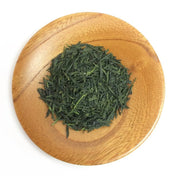Matcha Grades
You'll often see matcha listed in English as "ceremonial grade", "latte grade", "culinary grade", etc. In Japan, you will find only "matcha" and "culinary matcha", the assumption being that matcha is for use in the tea ceremony. It's primarily a marketing tactic aimed at helping you to choose products based on your usage purpose. We've adopted the below terms and are attempting to classify the products from our various vendors.- Ceremonial Grade - meant for drinking straight without sweetening, generally the highest quality and highest priced matcha products. Great aroma, great color, great taste, great texture. Production generally uses the best spring-harvested leaves and ground by a stone mill.
- Latte Grade - products that can be drunk straight (or use for practice by tea ceremony students), but priced reasonably enough that you wouldn't feel guilty sweetening the flavor. Decent aroma, great color, great taste, decent texture. Production generally uses spring-harvested or early summer harvested leaves, and ground by stone mill.
- Culinary Grade - meant for use as an ingredient in cooking, but depending on your taste preferences, go ahead and use them for lattes, smoothies, etc. Little aroma, decent color, decent taste, grainy texture. Production generally uses summer or autumn harvested leaves (which are allowed to grow larger for more volume), and ground using a ball mill (think drum-style dryer with ceramic balls that crush the leaves). This type of grinding results in a sharp grain vs a the smooth grain created by stone mills, and the crushing generates heat which degrades the aroma. In exchange, the large production volume reduces the price.
- Industrial Grade - not only for use in cooking, but for use by manufacturers making ice cream or chocolate, etc., where the matcha taste forms a base to be enhanced by the product's other ingredients. This grade uses leaves that have been allowed to grow large in the summer, but more likely autumn, resulting in a matcha that is more bitter than sweet in flavor, and like culinary matcha, ground by ball mill in large quantities.
Matcha in Japan as a Health Drink
Matcha is rarely marketed here in Japan as a health drink because powdered green tea is marketed for health purposes (being higher in antioxidants, especially EGCG catechins). The difference here is in the cultivation of matcha of all grades, farmers will shade the leaves to reduce the amount of catechin as much as possible. That is the first step in producing matcha's unique taste (the second step is to omit the rolling of the leaves during processing). Products marketed as powdered green tea, however, are generally left unshaded to grow leaves with a higher catechin content. Buy powdered green tea


